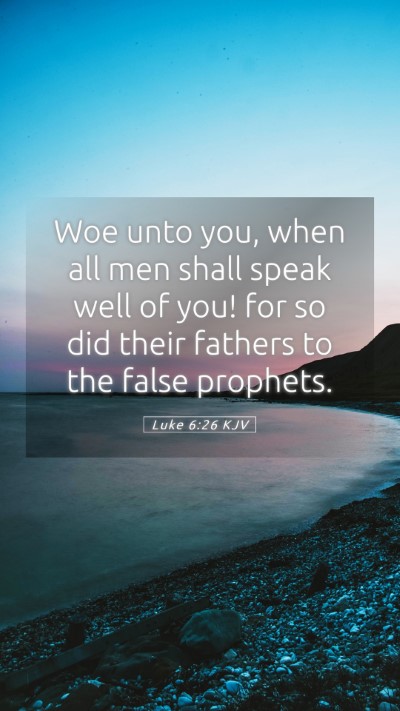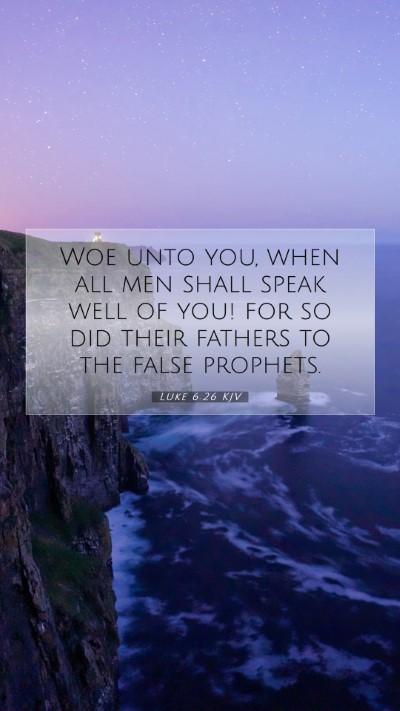Bible Verse Meaning: Luke 6:26
Verse Text: "Woe unto you, when all men shall speak well of you! for so did their fathers to the false prophets." (Luke 6:26, KJV)
Understanding Luke 6:26
This verse presents a warning against seeking the approval of others at the expense of truth and righteousness. It indicates a contrast between the true prophet and the false prophet, highlighting that popularity may often align more with deceit than with the integrity of God's message. The implications of this verse challenge believers to consider the motivations behind their actions and relationships.
Insights from Commentaries
-
Matthew Henry:
Henry draws attention to the specific "woe" pronounced upon those who seek commendation from the masses. He indicates that this desire for social approval often leads to moral compromises, much like the false prophets who received praise but did not deliver God’s true messages.
-
Albert Barnes:
Barnes interprets this verse as a rebuke against those who prioritize human opinion over divine truth. He elaborates on the fact that acceptance by the world can often signify a departure from God's path, reminding believers that the validation of God is far more significant than social acceptance.
-
Adam Clarke:
Clarke emphasizes the historical context behind false prophets and the societal dynamics that led to their acceptance. He notes that just as those who spoke falsehoods were lauded in the past, true followers of God often face opposition yet stand as witnesses to God's enduring truth.
Scripture Analysis
This verse serves as a crucial teaching moment, drawing the reader's attention to the conflict between societal norms and the core principles of the faith. It warns against the tendency to conform to societal expectations, emphasizing that true believers may often be at odds with prevailing sentiments.
Biblical Exegesis
In doing a thorough analysis of this scripture, we observe that the term "woe" is an indicator of judgment that God places upon those who are falsely praised. It implies the divine scrutiny over what constitutes true righteousness and fidelity to His word.
Applying the Verse to Daily Life
To apply the teachings of Luke 6:26, believers are encouraged to evaluate where they seek validation—whether from others or from God's commandments. This reflection can provide a pathway to understanding Scripture more deeply and aligning one's life with truth rather than popular opinion.
Cross References
- Matthew 5:10-12 - "Blessed are those who are persecuted for righteousness’ sake..."
- John 15:18-19 - "If the world hates you, you know that it has hated Me before it hated you."
- 1 Thessalonians 2:4 - "But as we were allowed of God to be put in trust with the gospel, even so we speak; not as pleasing men, but God..."
Bible Study Insights
In Bible study groups or online Bible studies, Luke 6:26 can serve as a profound discussion point about the nature of approval and authenticity in faith. Bible study materials that discuss the implications of this verse may provide deeper insights into how individuals can navigate their spiritual walk while remaining true to God’s expectations.
Conclusion
Luke 6:26 serves as a powerful reminder that alignment with God often places believers at odds with societal norms. Understanding this verse through various commentaries allows for a rich exploration of its meaning within both historical and contemporary contexts. Whether through Bible study lessons or personal reflection, the essence of Jesus' teaching continues to resonate today.


